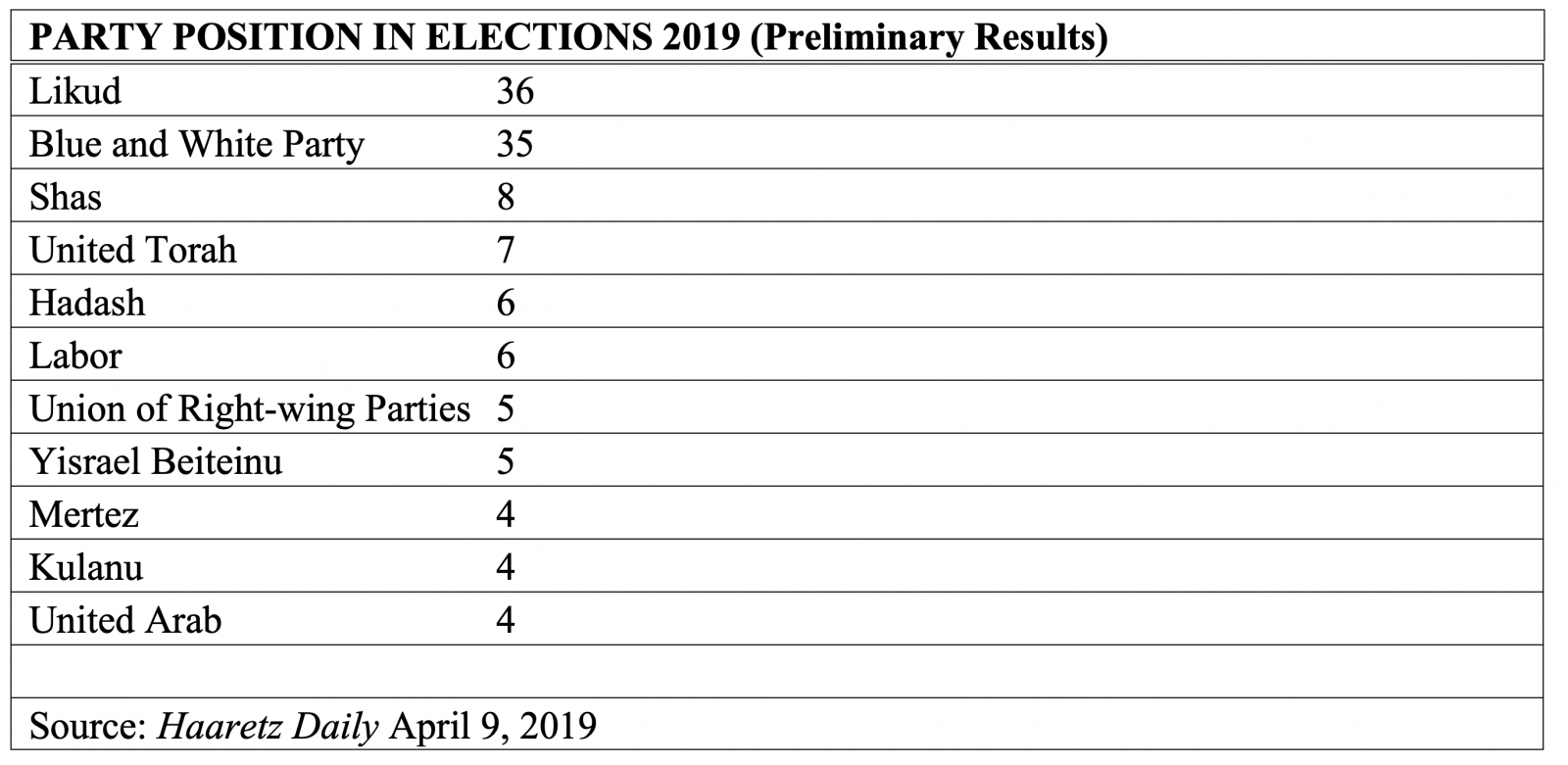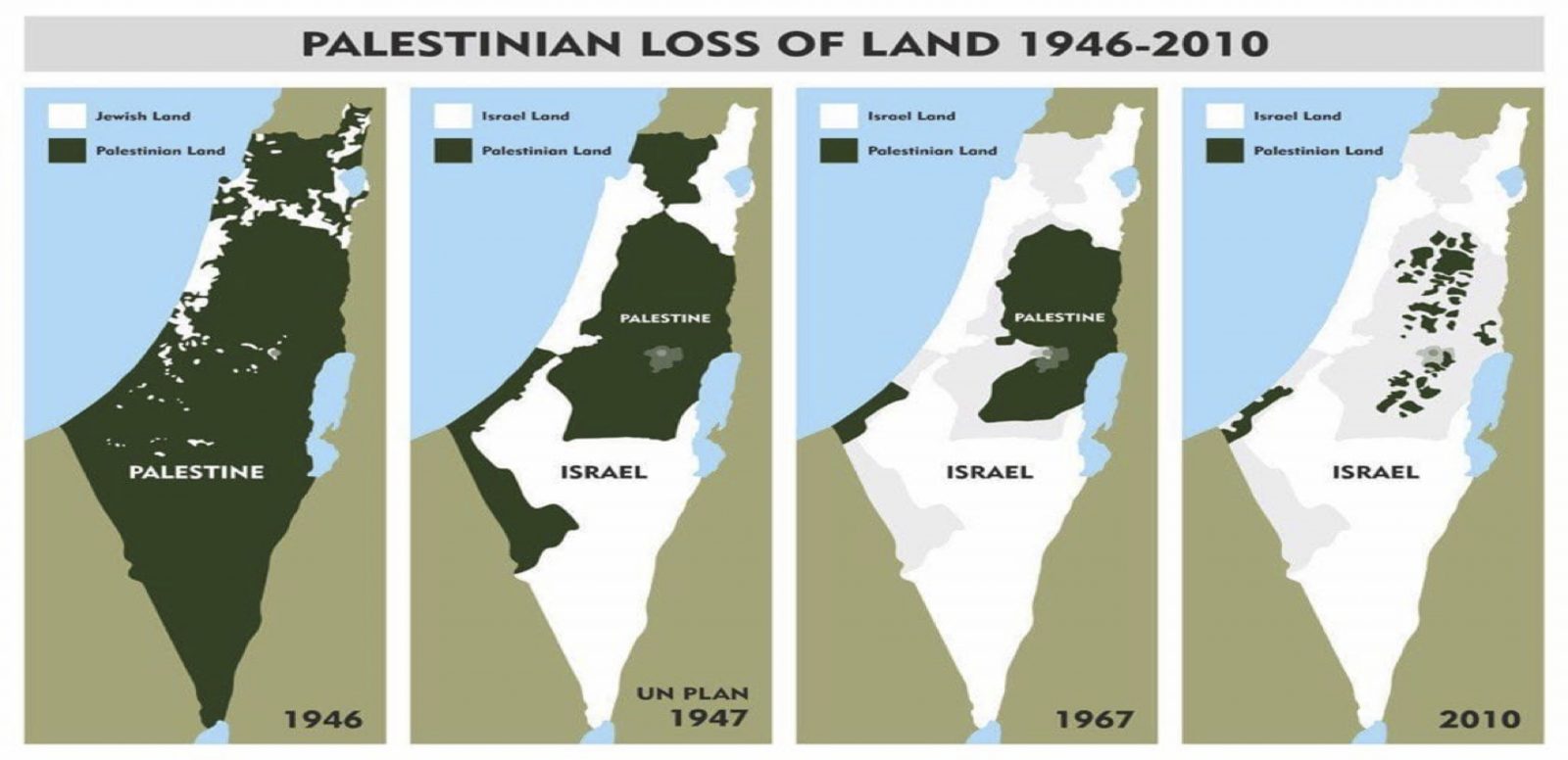 The unpredictable April 2019 Israeli elections for the 21st Knesset (parliament) between rightest Benjamin Netanyahu led Likud, and Centrist Blue and White party (a coalition of three parties) led by Benny Gantz were hotly contested. Though it showed divided mandate but Netanyahu’s Likud got a slim majority to form the next government. He would become a record fifth-time prime minister and longest-serving leader, surpassing nation’s founding father, David Ben-Gurion. The hardline and nationalistic approach of Netanyahu to annex the Palestinian lands with ‘One State Policy’ does not augur well for the people in West Bank and Gaza. Therefore, this analysis highlights the nature of the Israeli electoral system, Netanyahu’s policy towards Palestine, support of the United States for Israel, and the plight of Palestinians after the elections.
The unpredictable April 2019 Israeli elections for the 21st Knesset (parliament) between rightest Benjamin Netanyahu led Likud, and Centrist Blue and White party (a coalition of three parties) led by Benny Gantz were hotly contested. Though it showed divided mandate but Netanyahu’s Likud got a slim majority to form the next government. He would become a record fifth-time prime minister and longest-serving leader, surpassing nation’s founding father, David Ben-Gurion. The hardline and nationalistic approach of Netanyahu to annex the Palestinian lands with ‘One State Policy’ does not augur well for the people in West Bank and Gaza. Therefore, this analysis highlights the nature of the Israeli electoral system, Netanyahu’s policy towards Palestine, support of the United States for Israel, and the plight of Palestinians after the elections.
The Israeli electoral structure is based on the proportionate system, where each contesting party has to secure a designated electoral threshold to qualify for the membership of the Knesset. The Knesset elections were to be held in December 2019, but Benjamin Netanyahu called the elections a year earlier to stave off his possible indictment in the corruption cases. This election was contested by over 40 political parties, and the electoral threshold was 3.25 per cent. According to the preliminary results, the following is the party position in the Knesset;

From the Leftist Labor, which ruled Israel for over 30 years, the nationalistic ideology, regional strategic environment, and global uni-polarity has given birth to right-wing parties. This has led one expert to comment that ‘there is no Left; only a Right in different forms.’ The United Torah (7), Shas (8), Yisrael Beiteinu (5), Union of Right-Wing (5) and Kulanu (4) support Netanyahu and his vision for the Jewish State; whereas, Labor (6), Meretz (4) Hadash (6) and United Arab (4) support Gantz’s coalition. The numbers game clearly gives Netanyahu’s Likud, a leading position in the next coalition government. After consulting the main parties, the Israeli President Reuven Rivlin has asked Netanyahu to form a government for the next four years.
Netanyahu’s approach towards Palestine has galvanized the right-wing Israeli political parties to support his vision of the Jewish State. The ‘Law of the Return’ has increased Jewish Settlements in the occupied Palestinian lands, forcing Palestinians to become refugees in their own homeland. Replacing the ‘Two State Solution’ with Netanyahu’s ‘One State Policy,’ his annexation of East Jerusalem and declaring it the ‘Eternal Capital’ of the Jewish State, the control over West Bank, and the de-facto sovereignty declared over the Golan Heights are all serious causes of concern for the Palestinians. Foreign Policy Analysis states that ‘for two decades, Israel’s prime minister has sought to destroy the prospects for a Palestinian state. With a fifth term, he can finally do it.’ According to the Haaretz Daily, ‘the new Netanyahu government will have two main goals: ‘to get rid of the indictment looming in his future and to annex the settlements to Israel, in coordination with the Trump administration.’ More than 600,000 settlers are occupying the West Bank. Therefore, the victory of right-wing parties under Netanyahu would prove another obstacle to securing the future of the Palestinians.
Thanks to the strong Jewish Lobby on Capitol Hill, every successive U.S. Administration has shown its unflinching support to Israel, creating space for Israel’s unilateral geographic and political moves. However, ever-since Donald Trump took over the White House, the U.S. support has become more pronounced. Unlawful acts committed by the Israeli government under Netanyahu – declaring Jerusalem the eternal capital, continued annexation of Palestinian territories, and the assertion of Israeli sovereignty over the Golan Heights – have all been fully endorsed by President Trump.
In fact, many observers believe that the rise of right-wing political parties in Israel and their support to Netanyahu’s Likud has been boosted by Trump’s unflinching support. The rise of nationalism through ‘America First’ and populist movements across Europe studded with the pressure of Jewish Settlers have bolstered the anti-Palestine approach of Israel’s right-wing segment, particularly that of Netanyahu. This situation has made the U.S. an unjust power-broker in the Israel-Palestine conflict and Middle Eastern peace.

The Palestinian people are the ultimate victims in this ultra-nationalistic Israeli approach, a chaotic regional environment and the lack of international support. This situation has led one Palestinian analyst to comment on Netanyahu, ‘The message that the Israeli public has sent is very clear. They support him, they support his policies of apartheid, they support his policies of colonization.’ The Palestinian leader, Saeb Erekat expressed the view that ‘the Israelis have voted No to peace and Yes to the occupation.’
The ultimate loss is the possible Palestinian State. An Arab commentator expressed his disappointment by stating that ‘it closes all doors for any possible peace settlement and any chance for the Palestinians to have a state of their own.’ First, they were colonized by Israel and ejected from their own homes by the Jewish settlers, and now the forceful annexation by Israel has pushed them to the wall, forcing them to resort to violence. Serious concerns for the Palestinian people include a divided Palestinian leadership, the lack of Arab support (both financial and political), and international isolation. Therefore, the Jared Kushner Peace Plan for the region appears to be ‘dead on arrival.’
In an age of globalization and democratic practices, it seems unjustified that Israel exercises the ‘Law of Return’ and denies the same to the Palestinians. Israelis are given the right to choose their leaders with right-wing ideology, but Palestinians are thrown out of their own homes and lands through annexation and ejection. Democracy is the best form of governance if it enshrines the rights of all. Otherwise, it becomes a brute majority imposing its will. For decades, Palestinians have been denied their rights, peaceful living, and a secure future, and their desire for peaceful coexistence has been met with force. The latest Israeli election results have reinforced their frustration and anguish which could provide justification for the violent approach of militant organizations such as Hamas and Hezbollah, and would lead the region towards more uncertainty, chaos, and violence.
Dr. Nazir Hussain is Professor and Director School of Politics and International Relations, Quaid-i-Azam University, Islamabad. He has over 30 years of teaching, research, and administrative experience. He has a Post-Doc Research Fellowship from the French Institute of International Relations, (IFRI), Paris-France, a Post-Graduate Diploma in Conflict Resolution from the University of Uppsala-Sweden, a Visiting Fellowship of the Henry L. Stimson Centre, Washington DC., and is a Research Associate with the International Committee of Red Cross (ICRC). He has over 70 research publications in international and national academic journals.
Related Posts
![]()




The author has provide a striking insight into electoral dynamics of Israeli politics. It is unfortunate that the phenomena of rightest march on world stage is shaking out societies and polities across world and does not bode well for world harmony. The break-up provide by the author clearly indicates that the rise of right political coalition led by hard core rightest Netanyahu has darkened the prospects of two state solution of Palestine-Israel conflict. The author deserve an applause for keeping the readers community abreast of latest development taking place in Middle East. We can only hope people at helm of affairs may take advantage of noting trends highlighted by authors to set their policy direction.